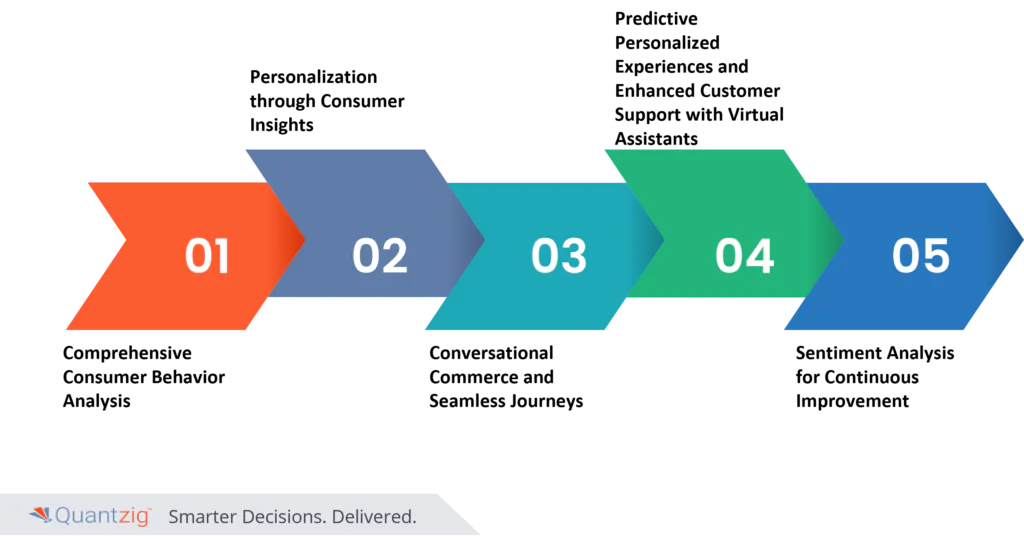Organizations with a customer-centric strategy deliver value, enhance customer experience (CX) at various touchpoints, and positively impact the bottom-line results. Marketers are leveraging artificial intelligence (AI) and predictive analytic tools like customer analytics to gain insights about their target market and existing customers. Customer experience ai and big data analytics help businesses to not only streamline their processes but also in improving their customer experience. By integrating artificial intelligence and customer analytics within the business processes, companies can create a positive experience for the end-user, increase consumer spending, build customer loyalty, and drive brand advocacy to gain a competitive advantage in the market.
Table of Contents
Customer Experience and Artificial Intelligence: Enhancing Engagement and Loyalty
- Personalized Interactions with Chatbots: Artificial Intelligence, particularly chatbots, plays a significant role in providing personalized interactions to customers. Chatbots leverage natural language processing and machine learning to understand customer queries and preferences. They offer instant responses, guide customers through various processes, and create a personalized experience, thereby enhancing overall satisfaction.
- Predictive Analytics for Anticipating Customer Needs: Artificial Intelligence, in conjunction with predictive analytics, enables businesses to anticipate and fulfill customer needs proactively. By analyzing historical data, AI systems can predict customer preferences, buying patterns, and potential issues. This anticipatory approach ensures that brands are well-prepared to meet customer expectations, contributing to a positive experience.
- Customer Journey Optimization: AI technologies help optimize the entire customer journey by providing seamless and consistent interactions across all touchpoints. Through machine learning algorithms, businesses can understand customer behaviors, preferences, and pain points. This valuable insight allows for the continuous refinement of the customer journey, ensuring a cohesive and enjoyable experience from awareness to purchase and beyond.
- Efficient Query Resolution with AI-powered Support: Artificial Intelligence enhances customer support by automating and streamlining query resolution. AI-powered support systems can handle routine inquiries, troubleshoot common issues, and provide relevant information, freeing up human agents to focus on more complex customer needs. This efficiency contributes to faster query resolution and improved customer satisfaction.
- Personalization through Machine Learning: Machine learning algorithms analyze vast amounts of customer data to create highly personalized experiences. From personalized product recommendations to tailored content, AI-driven personalization ensures that customers receive offerings that align with their preferences. This level of personalization contributes to a stronger emotional connection between the customer and the brand.
- Feedback Analysis for Continuous Improvement: AI facilitates the analysis of customer feedback, reviews, and sentiments in real-time. Natural language processing algorithms can decipher customer sentiments and identify areas for improvement. This feedback loop allows businesses to adapt quickly, address concerns, and continuously refine their products or services to better align with customer expectations.
- Virtual Assistants for Seamless Interaction: Virtual assistants powered by AI offer a seamless and interactive customer experience. These assistants can assist customers in various tasks, provide information, and guide them through processes. The conversational abilities of virtual assistants contribute to a more natural and engaging interaction, enhancing the overall customer experience.
Contact us to know more about customer analytics and its advantages.
How Does Artificial Intelligence Improve Customer Experience?
Artificial intelligence and chatbots help in creating personalized experiences and enabling intelligent, accessible engagement with the customers. It assists the end-user to achieve their objective or offers solutions to their problems, thus, driving satisfaction and improving the overall customer experience. Artificial intelligence also enables businesses to gain insights into consumer behavior by sorting through a large amount of data generated and helps them to navigate, understand, and enhance the sales or customers’ journey. But in what ways will artificial intelligence impact the customer experience, you ask? Here’s how.
Let’s delve deeper into how AI shapes and improves the customer experience.

- Comprehensive Consumer Behavior Analysis: Artificial intelligence empowers businesses to harness the wealth of available data and gain profound insights into consumer behavior and traits. Through advanced customer analytics, AI enables organizations to streamline the customer interaction process. By making information available and accessible across multiple touchpoints, businesses can tailor their approach to meet individual customer preferences and needs.
- Personalization through Consumer Insights: Leveraging the abundance of consumer data collected from various devices, AI provides businesses with valuable insights into consumer behavior and market trends. This wealth of information allows organizations to incorporate a high degree of personalization into the customer experience. Interactive applications such as chatbots, exemplified by platforms like Facebook Messenger, utilize AI to engage in dynamic and personalized conversations with customers, addressing queries, providing recommendations, and enhancing overall satisfaction.
- Conversational Commerce and Seamless Journeys: AI plays a pivotal role in enabling conversational commerce, seamlessly connecting individual touchpoints and completing customer journeys. This integration enhances and re-designs customer experiences, providing a cohesive and fluid interaction throughout various stages. Conversational AI interfaces, powered by machine learning algorithms, contribute to the creation of intuitive and responsive systems that adapt to customer preferences in real-time.
- Predictive Personalized Experiences: AI’s ability to analyze historical customer data allows businesses to predict future needs and preferences. By understanding patterns and trends, AI can anticipate customer requirements, enabling organizations to proactively offer personalized experiences. This predictive capability ensures that customers receive relevant and timely information, product recommendations, and support, fostering a sense of satisfaction and loyalty.
- Enhanced Customer Support with Virtual Assistants: AI-driven virtual assistants, equipped with natural language processing and machine learning capabilities, revolutionize customer support. These virtual assistants can efficiently handle customer queries, provide instant solutions, and offer 24/7 support. By automating routine tasks and inquiries, businesses free up human resources to focus on more complex issues, ensuring a faster and more efficient customer support experience.
- Sentiment Analysis for Continuous Improvement: AI technologies, including sentiment analysis, allow businesses to gauge customer sentiment and feedback. Analyzing customer reviews, social media interactions, and other textual data, AI discerns the emotions and opinions of customers. This valuable information aids businesses in understanding areas of improvement, addressing concerns promptly, and continuously refining the customer experience.
In essence, the integration of artificial intelligence into customer experience ai strategies empowers businesses to elevate their interactions with consumers. From in-depth consumer behavior analysis to predictive personalization and enhanced customer support, AI-driven solutions pave the way for a future where customer experiences are not just transactional but deeply personalized, responsive, and fulfilling.


